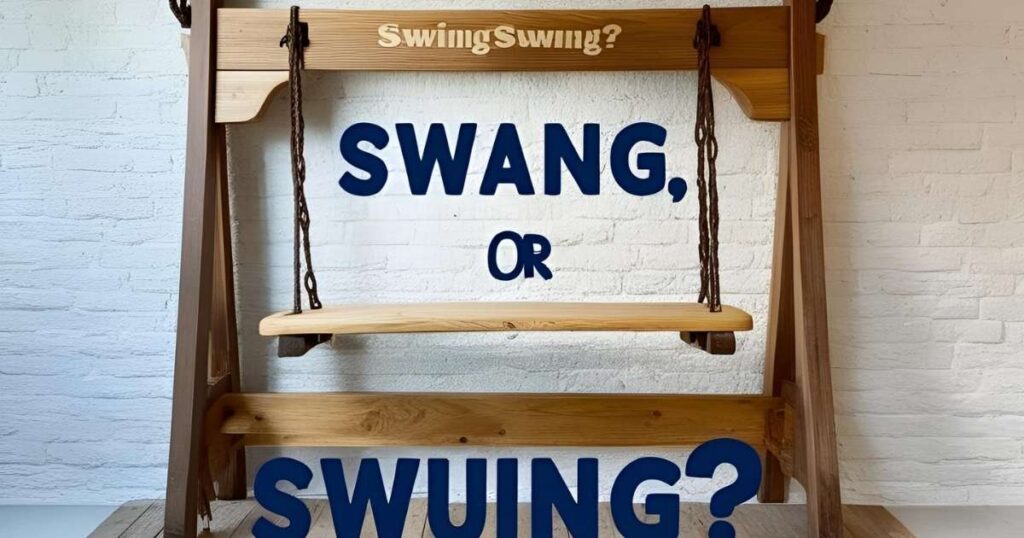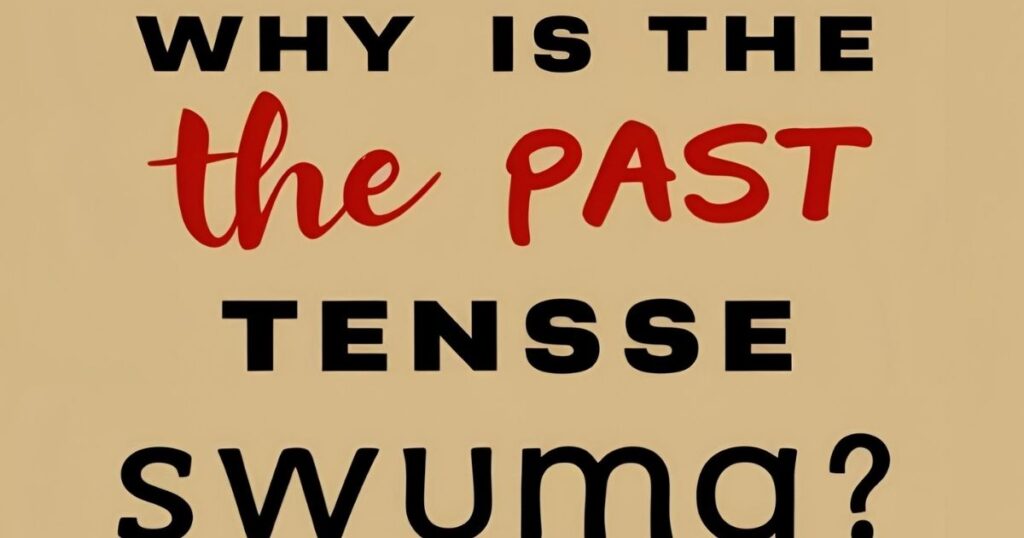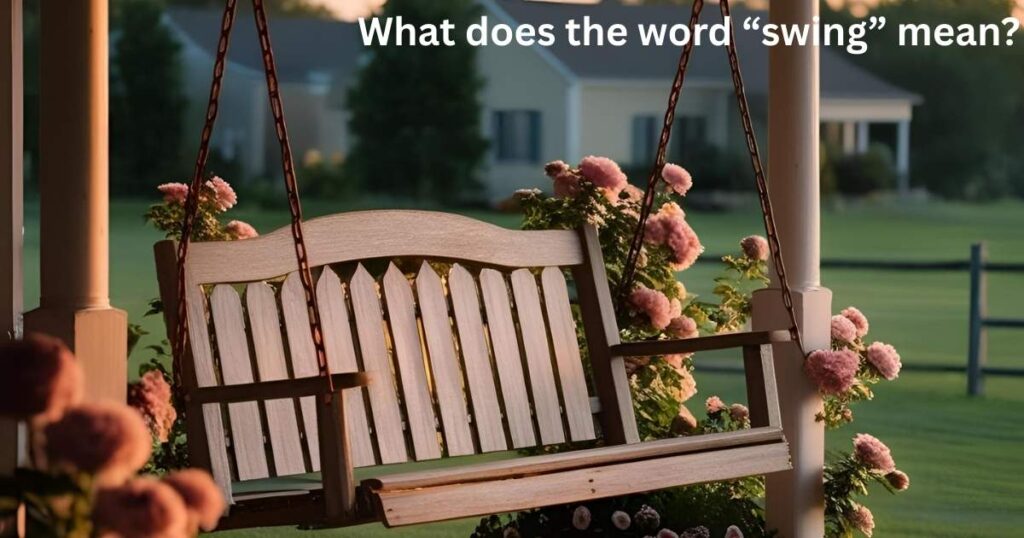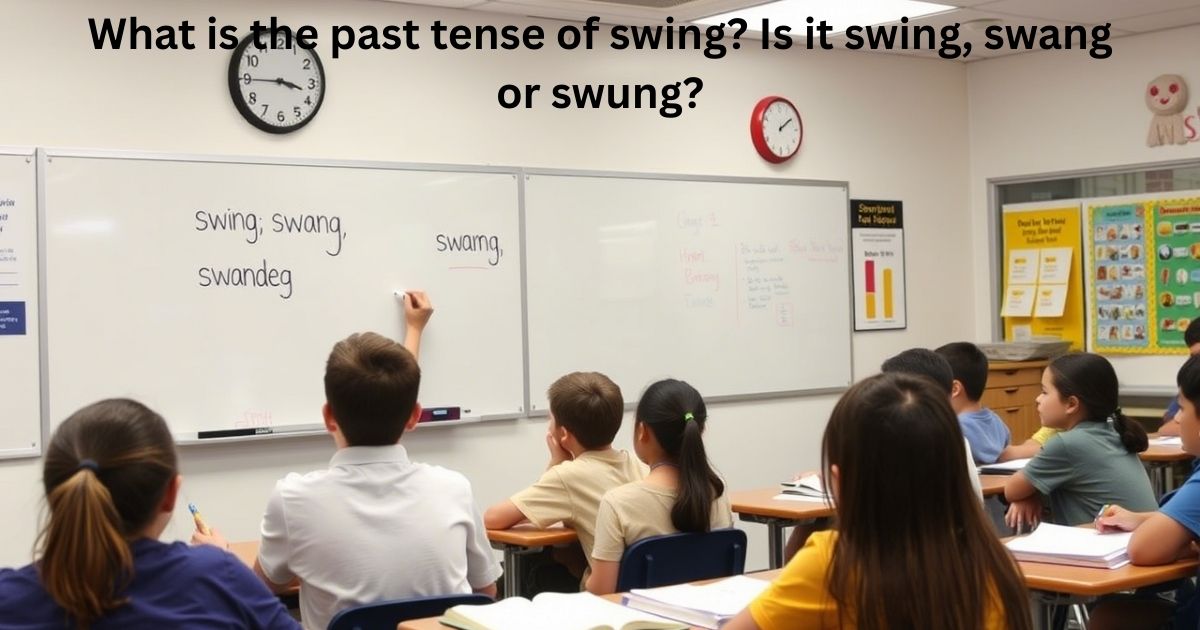English can be tricky, especially when dealing with irregular verbs. One question that often puzzles learners is: What is the past tense of swing? Some people say “swang,” others use “swung,” and a few might even wonder if “swinged” is acceptable. The confusion comes from how English has evolved, with certain verbs changing form over time.
But what is the past tense of swing? To answer that, we need to look at verb patterns, common usage, and grammar rules. This isn’t just about grammar books,it’s about how people actually speak and write every day. So, what is the past tense of swing? Is it “swang” or “swung”? Don’t worry. By the end of this article, it’ll all make sense with helpful examples, correct usage, and simple explanations made for learners like you.
Swing, swang or swung?

There’s a reason so many people feel baffled by this verb. The confusion likely comes from other irregular verbs like ring (rang, rung) or sing (sang, sung). That -ang to -ung pattern can be tempting to copy with swing. However, English doesn’t always play by its own rules. You can’t just apply one verb’s pattern to another and hope it sticks. While “swang” might sound right, especially to a child swinging across a rope above a pond in a storybook, it doesn’t match the standard usage in modern English writing or spoken word.
In British English and American English, “swung” is accepted in every type of writing ,academic, journalistic, conversational, and even literary. If you were reading an article from BBC Sport or Manchester Online describing a tennis match featuring Murray Fed, you’d see the word “swung,” not “swang.” Even classic authors like Elizabeth Barrett Browning or Wordsworth would have chosen “swung” over “swang,” unless they were using poetic license. So, while you may occasionally hear “swang” in dialect-heavy regions like Devonshire, Midlands, or Sonoma County, it’s best to stick with “swung” if you want to be clear and correct.
Read this Also: What’s the Past Tense of Panic? Is it Panic or Panicked?
What’s the past tense of “swing”?
To keep things simple: the past tense of swing is swung. This is true whether you’re talking about a child swinging on a tire above a river, a player swinging a bat on the field, or someone swinging their arms during a rainy hike through the ridge. “Swinged” is also not a correct form,it sounds like a mistake and is never used, not even in informal or colloquial speech.
English verbs come in two main types: regular and irregular. Regular verbs follow a rule,you just add “-ed” to make the past tense. Words like “jump” become “jumped.” But swing is irregular, just like wring (which becomes wrung) and fling (which becomes flung). These verbs don’t follow the rule, which is why learning their lexical variation is essential if you want to write like a Senior Member of a language forum or ace a grammar test in California or Buenos Aires.
Why is the past tense “swung”?

The reason we say “swung” instead of “swang” lies in how English has evolved over centuries. English has absorbed influences from Germanic, Latin, and even French roots, creating a language full of exceptions and variant forms. “Swing” originally came from Old English and was used in various dialects across England, including in Glorious Devonshire and parts of English England. Over time, the morphological structure settled into the form we use today: swing, swung, swung.
Language isn’t frozen in time. As lexical usage spreads through media, press, and conversation, certain forms become the norm. If a journalist in Los Angeles writes about how a player “swung” the ball past defenders, that sentence has to be clear to readers across US English and UK English regions. Even in peer-reviewed linguistic studies and corpus analyses, “swung” consistently appears as the past tense form of swing. It’s a great example of how the spoken word shapes written rules.
How to pronounce “swing” and “swung”
Understanding how to say these words out loud helps with both speaking and listening. Whether you’re at a spelling bee or practicing English in Kalamazoo, you want your pronunciation to sound natural.
Pronouncing “swing”:
The word “swing” is pronounced as /swɪŋ/. It starts with a smooth “sw” sound followed by a short “i” like in “bit” and ends with a nasal “ng” sound like in ring or thing. This rhythmic, to-and-fro sound mirrors the motion the word describes,like a net gently moving in the wind, or a cloud drifting before it drops rain. It’s sharp, simple, and easy to remember.
Pronouncing “swung”:
“Swung” sounds like /swʌŋ/. It begins with “sw,” then shifts to a short “u” as in “cup,” ending again in that “ng” nasal. Say it like “swung.” Think of a wet towel being squeezed after being soaked in water. The word itself feels heavier, more complete,like the motion is over, the action done. That’s part of what makes “swung” so effective in past tense usage. It’s solid and definite.
What does the word “swing” mean?

The word “swing” is versatile. Literally, it means to move back and forth or side to side, often in a curved path. You can swing across a ridge, swing a ball with a bat, or feel your mood swing on a difficult day. In sports commentary,say, from BBC Weather or X Factor-style journalism,it might describe momentum shifting sharply, like when Barthez Fabien made a surprise save.
But it also has figurative meanings. Politicians swing votes, moods swing during stressful times, and temperatures swing from high to low, especially in places like Sonoma County or Midlands. This flexibility in meaning shows how English adapts. The word captures physical, emotional, and even abstract movement. That’s why it’s so commonly used across different registers,from formal discourse to everyday chat.
A simple tense table
| Tense | Example |
| Present | I swing the bat. |
| Past | I swung the bat. |
| Future | I will swing the bat. |
| Present Perfect | I swung the bat. |
| Past Perfect | I swung the bat. |
| Future Perfect | I will have swung the bat. |
| Present Continuous | I am swinging the bat. |
| Past Continuous | I was swinging the bat. |
| Future Continuous | I will be swinging the bat. |
| Present Perfect Continuous | I have been swinging the bat. |
| Past Perfect Continuous | I had been swinging the bat. |
| Future Perfect Continuous | I will have been swinging the bat. |
Origin of the word “swing”
The word “swing” comes from Old English, specifically “swengan,” which meant “to shake” or “to whip.” It traces even further back to Proto-Germanic roots. As English branched off and blended with other tongues, “swing” took on more meanings,from the violent lashing of a rope to the gentle motion of a porch swing.
Writers like Wordsworth and Elizabeth Barrett Browning used it to describe nature’s subtle moves, like a branch shifting in a breeze, or a child’s laughter echoing from a playground. Over time, the word picked up colloquialism, entered sports slang, and became a cultural image used in newspapers, forum threads, and even political discussions.
Using “swing” and “swung” in sentences
Let’s look at real-world examples to drive the point home. Whether you’re describing a baseball player in California, a dancer in Buenos Aires, or a school kid in France, “swing” and “swung” are used with care depending on the tense and context.
Using “swing” in a sentence:
Every afternoon, the kids swing across the pond using a rope tied to an old tree.
During her speech, her emotions seemed to swing from joy to confusion.
The towel swung on the line as the wind picked up before the rain fell.
He loves to swing his golf club on the weekends in Sonoma County.
In Devonshire, you’ll often see gates that swing open on their own in the wind.
Using “swung” in a sentence:
She swung her arms in frustration, trying to explain what had gone wrong.
Last week, we swung by Los Angeles for a quick vacation and got soaked by a sudden storm.
The chandelier swung gently during the earthquake, catching everyone off guard.
He swung the hammer with force, causing the wall to crack.
They swung the net quickly to catch the fish before it could escape.
Synonyms of “swing” and “swung”

Sometimes it helps to use a different word to express the same idea, especially in creative writing or when avoiding repetition. Synonyms add variety and flavor.
Synonyms for “swing”:
Some common ones include sway, rock, oscillate, pendulum, flutter, swoop, and bounce. Each has its own tone,“sway” feels gentle, while “swoop” feels sharp and fast. These can help you paint more vivid pictures in your storytelling.
Using “swing” in a sentence:
- Children go to the park every day and play on the swings.
- A small child laughs while swinging back and forth after someone gives a push.
- A wooden swing on the porch moves gently in the breeze as I read a book.
- The ticking of a big clock sounds like the swing in my grandparents’ house.
- A little girl smiles while playing on a tire swing tied to a strong tree.
- A climber swings from one jungle vine to another, trying to go higher.
Synonyms for “swung”:
When you’re using the past tense, you might say someone swept, brandished, wielded, or flourished something. These words fit especially well in descriptive or dramatic settings,like describing a knight who brandished a sword, or a kid who wielded a washcloth like a superhero cape.
Using “swung” in a sentence:
- A player swung the golf club hard and hit the ball across the grass.
- Last summer, we swung in hammocks by the sea and felt very relaxed.
- A clock’s pendulum swung slowly, showing how time was passing in the quiet room.
- A couple held hands and swung their arms as they walked in the sunlight.
- In a dark room, a light swung softly, making shadows move on the walls.
- A child hit the piñata with a bat and swung hard, waiting for candy to fall.
Conclusion
So, what is the past tense of swing? It swung. Not swang, not swinged,just swung. Many people get confused, but the rule is simple. If you ever wonder, what is the past tense of swing?, remember this article. We use swung in both writing and speech. It’s the correct word in American and British English. You might hear swang in stories, but it’s not standard. The next time you ask, what is the past tense of swing?, you’ll know the right answer.
Understanding verbs can be tricky. But now, the question is, what is the past tense of swing? won’t confuse you. Use swung to sound natural and correct. It fits every sentence and situation. So, if someone asks, what is the past tense of swing?, you’ve got it!

Gramcoachpro is your go-to platform for mastering grammar, writing, and communication skills. If you’re a student, teacher, or content creator, we provide easy-to-understand tips, examples, and tools to improve your language — fast and effectively. Our mission is to make better writing simple and accessible for everyone.

